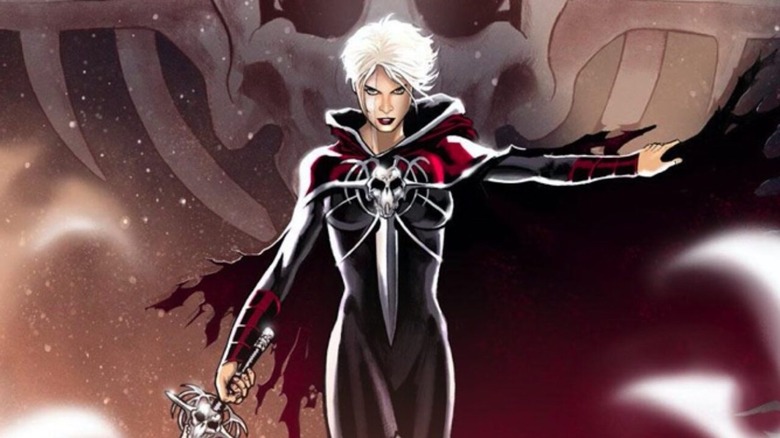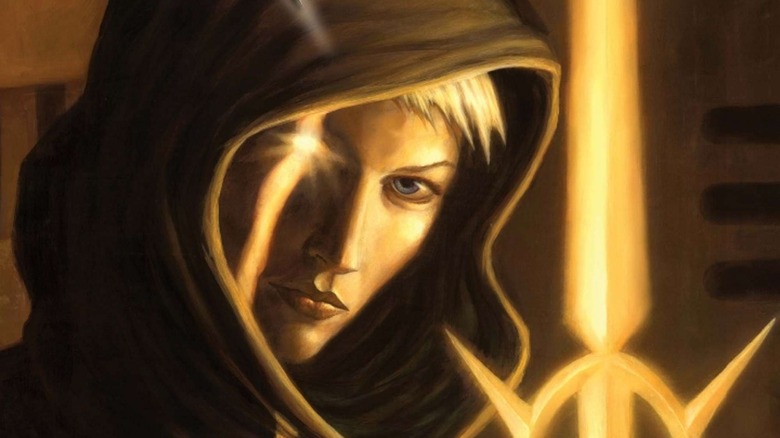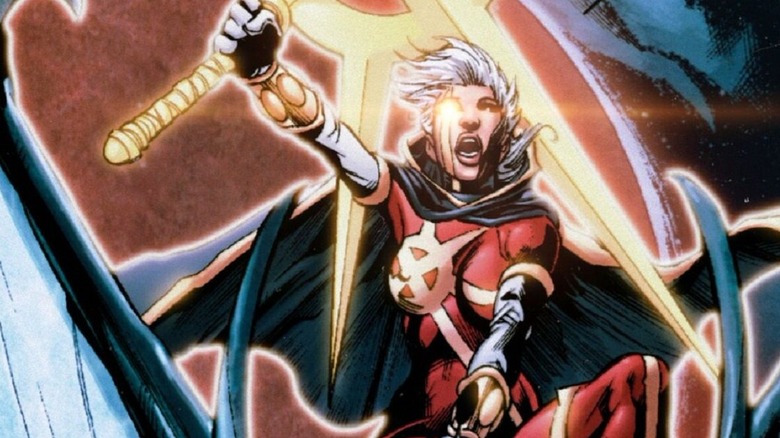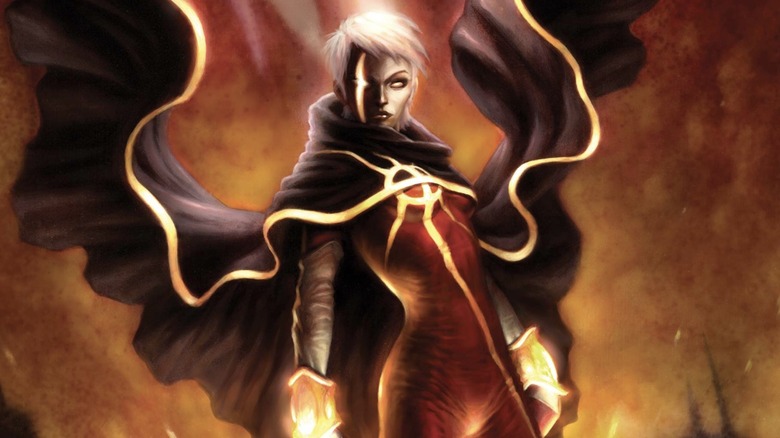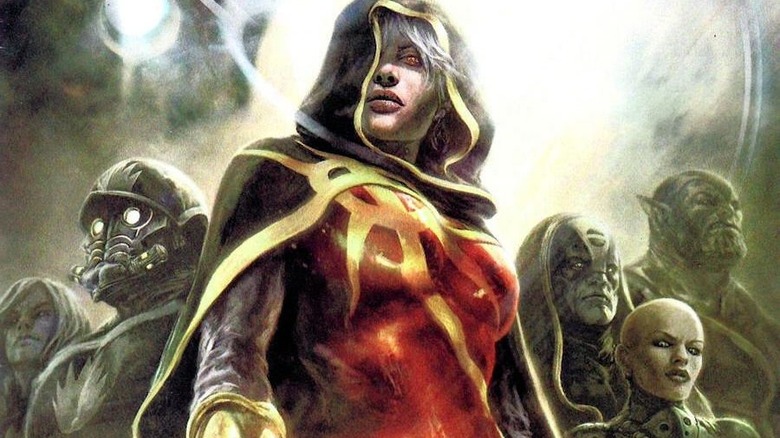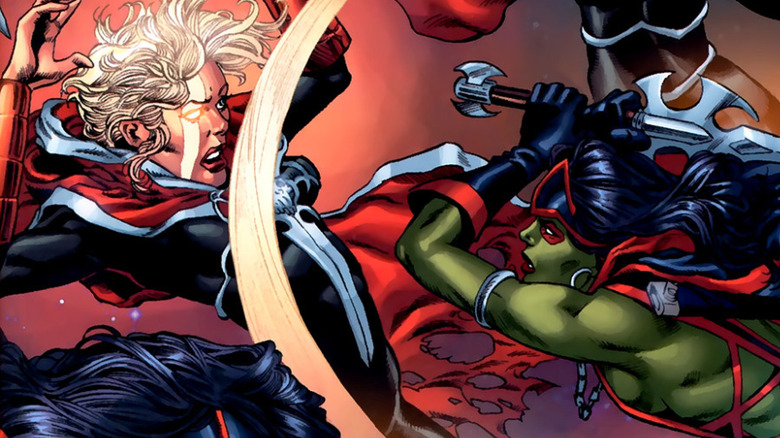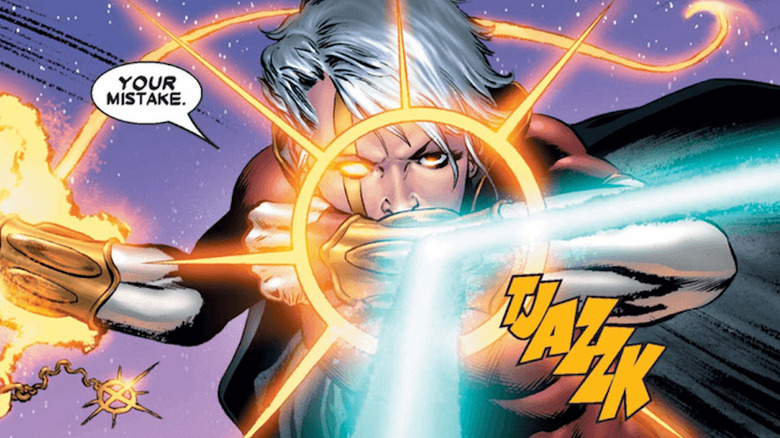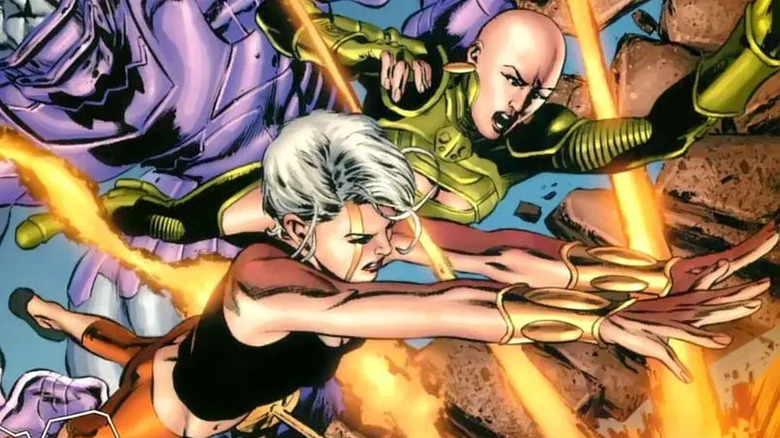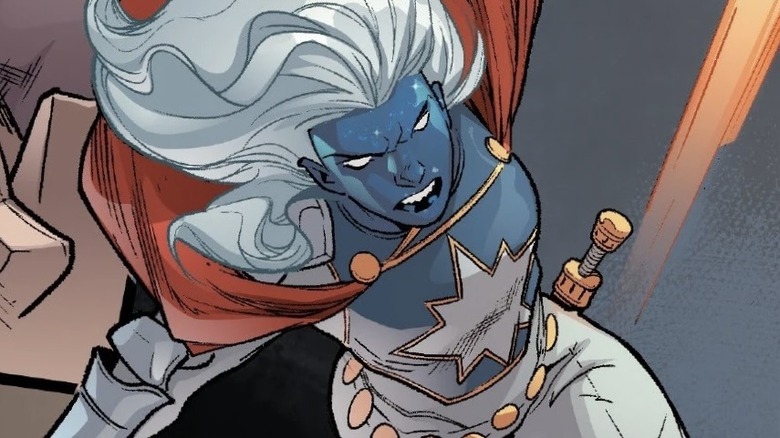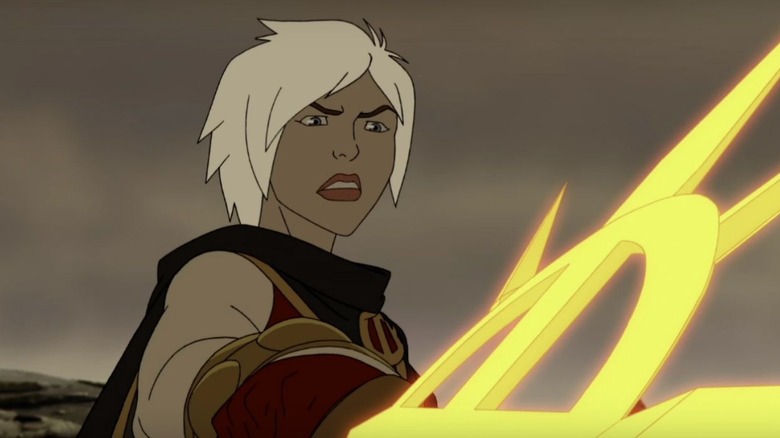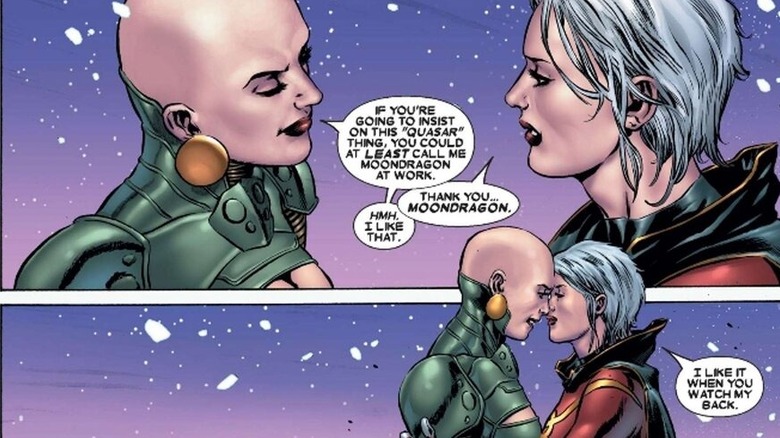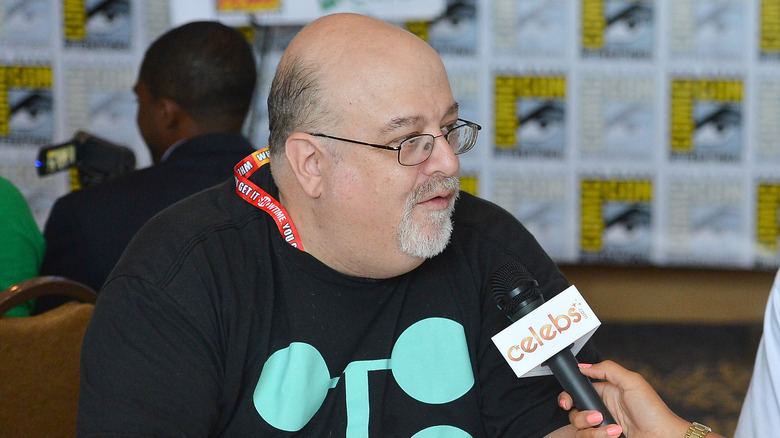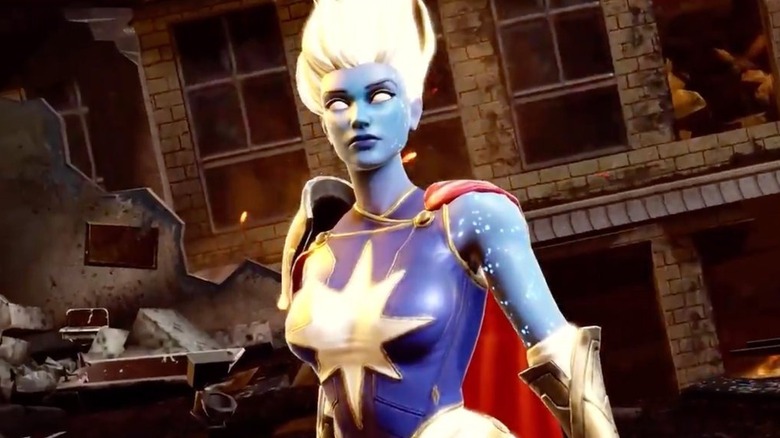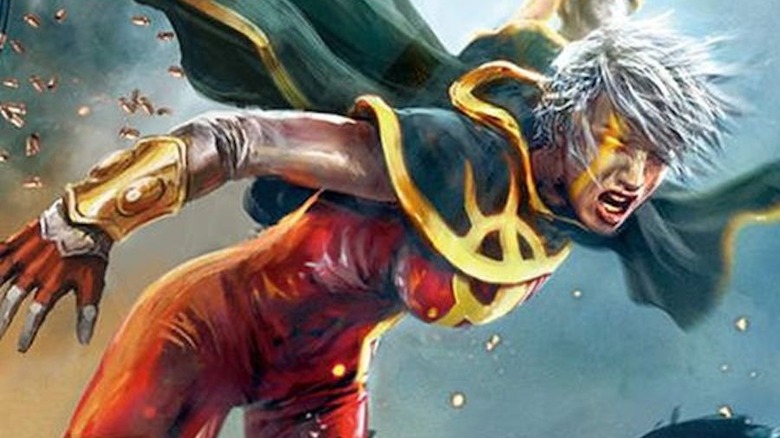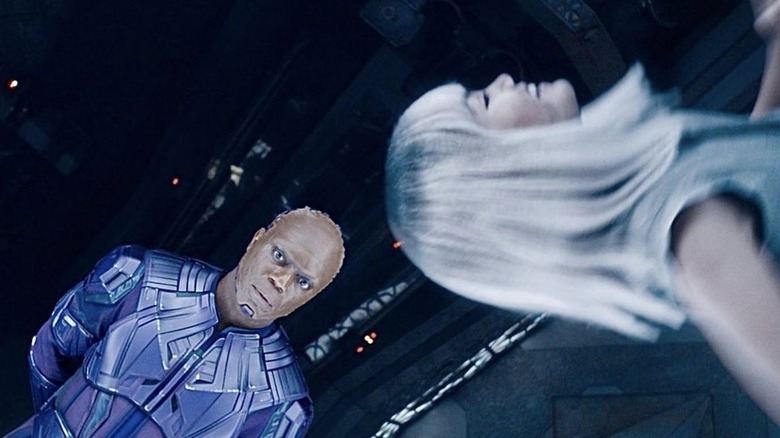The Untold Truth Of The Guardians Of The Galaxy's Phyla-Vell
Unless you're a diehard reader of Marvel Comics, you may never have heard of Phyla-Vell, cosmic super-heroine and founding member of the second generation of Guardians of the Galaxy. Though she doesn't have quite the long and noble history of Marvel's pantheon of better-known greats, her legacy is no less interesting, full of thrilling adventures and battles with some of Marvel's most mighty villains.
Part Kree, part Eternal, Phyla-Vell can hang with the biggest heroes in the Marvel Universe, and with her recent introduction into the Marvel Cinematic Universe, she's gaining sudden attention. From her mighty lineage to her complicated origins, and her prominent role in some of the most important storylines of the past 20 years, there's probably a lot you don't know about Phyla-Vell. But don't worry, because we're here to help, with all the secrets — past and present — that you need to know now that she's entered the MCU.
Phyla-Vell was never supposed to exist
When it comes to the cosmic side of the Marvel Universe, things can get a little complicated, and the origins of Phyla-Vell are certainly no exception. Making her debut in 2003, Phyla-Vell is revealed to be the daughter of one of Marvel's mightiest and most iconic '70s superheroes, the interstellar champion Mar-Vell, better known as the original Captain Marvel. But it's not as simple as just being born of a union between Mar-Vell and another cosmic hero. No, it could never be that ordinary. Phyla-Vell was retroactively brought into existence through the efforts of her brother, Genis-Vell, in a storyline that saw him reboot the entire universe.
In an ambitious storyline in the pages of "Captain Marvel" in the early 2000s, Genis-Vell — then known as the new Captain Marvel — is driven mad and proceeds to destroy the entire universe at the behest of the god-like being Entropy. In the end, they remake all of existence, and Genis later discovers to his surprise that in this new version of reality, he now has a sister, Phyla-Vell. Genis-Vell's mother Elysius — the lover of Mar-Vell who had conceived Genis through science, using elements of Mar-Vell's genetic code — had done the same to bring Phyla-Vell to life.
She has gone by many names
In the Marvel Universe, a superhero identity can easily be passed from person to person, whether it's from a hero to their sidekick — such as when Bucky Barnes became Captain America — or from hero to hero, like when Peter Parker briefly became Daredevil. In the course of Phyla-Vell's short existence in the comics, however, the cosmic hero has gone through superhero identities like they're a fashion statement.
Not long after her introduction in "Captain Marvel" (Vol. 5) #16, Phyla is granted the identity of Captain Marvel by her mother Elysius, who deems Phyla's brother Genis-Vell no longer fit to use the heroic title. This made her one in a long line of heroes to hold the moniker, from her father Mar-Vell down to Air Force pilot Carol Danvers. But that was hardly the only superhero identity she's held. The next was the namesake of another Marvel stalwart: After the hero Wendell Vaughn was killed by the villain Annihilus, she stole back Vaughn's Quantum Bands, which anoint her the new Quasar.
But that's not all, as after a confrontation with the entity known as Oblivion — the embodiment of non-existence — Phyla-Vell agrees to become the corporeal avatar, taking the name of Martyr.
She's a cosmic powerhouse
As a part of the mighty lineage of Mar-Vell, Phyla-Vell is one of the most powerful heroes in the cosmic side of the MCU. According to the Nova Corps — Marvel's interstellar police force — Phyla-Vell is considered a potential "Continental Threat," and for good reason. The creation of her mother Elysius, mixing her father's Kree DNA with her own Titan Eternal biology, Phyla-Vell possesses natural physical power that goes beyond either of her progenitors, including the superhuman speed, agility, reflexes, and durability you'd expect from a cosmic juggernaut, as well as her father's cosmic awareness.
But that doesn't even begin to take into account the incredible weapons at her disposal. From her original Nega-Bands to the Quasar's Quantum Bands, these powerful accessories increased all of her existing powers, allowing her to travel at faster-than-light speeds. She later retained the bands' ability to manipulate quantum forces, creating energy constructs, force fields, and waves of destructive energy.
For much of her time as a cosmic hero, Phyla-Vell wielded the Quantum Sword, constructed through the energy of the Quantum Bands. After becoming Martyr, the avatar of the entity Oblivion, the sword took on a new form, becoming the Oblivion Sword, which was eventually usurped and used against her by Adam Warlock's evil self, the Magus.
She's been a part of some major Marvel events
Introduced in late 2003, Phyla-Vell lived in her own little corner of the cosmic Marvel Universe for quite a while, mostly appearing as a supporting character in her brother Genis-Vell's own series, "Captain Marvel." But when that series ended with issue #25 in 2004, Phyla-Vell was shuffled off, hardly seen again until a major cosmic crossover event in 2006.
That year, Marvel worked Phyla-Vell into the cataclysmic "Annihilation" event series, which saw the Fantastic Four villain Annihilus seek universal armageddon. It's during this event that Phyla-Vell became allied with Nova and Peter Quill, serving as a key hero in the fight to save the galaxy from the Annihilation Wave. This was also the story that saw her attain the Quantum Bands and take on an increased role as a hero in the Marvel Universe, inheriting the mantle of Quasar.
As Quasar, Phyla-Vell played an even bigger role in the subsequent crossover, "Annihilation: Conquest," which also led to her finally getting her own title, a short-lived four-issue mini-series, "Annihilation: Conquest – Quasar." It was out of that storyline that the Guardians of the Galaxy were born, with Phyla-Vell serving as a founding member alongside Star-Lord, Gamora, Drax, Rocket Raccoon, Adam Warlock, and Groot.
She's fought friends and foes
When you think of Phyla-Vell facing off against big Marvel baddies, you think of supervillains like Annihilus, and Ultron and their minions — like the Phalanx, who she went toe-to-toe with during various "Annihilation" event stories. But Phyla-Vell's adventures have seen her take on villains far beyond these, including the Mad Titan Thanos, and even the Super-Adaptoid, a construct of Advanced Idea Mechanics powered partially by the Cosmic Cube. Much more interestingly, however, is that Phyla-Vell has always seemed to find herself in showdowns against her fellow heroes.
In fact, Phyla-Vell's first appearance had her battling her own brother, Genis-Vell, at the behest of her mother Elysius. Genis-Vell was still uncontrollable from his madness, and in the beatdown, Phyla-Vell usurped the name of Captain Marvel from him. Later, amid the "Secret Invasion" storyline, when Skrulls were revealed to have been posing as Marvel's greatest heroes, Phyla-Vell came to blows with Gamora, with both fearful of the other being an undercover enemy agent.
Later, Phyla-Vell, while in the service of the being known as Oblivion, was instructed to kill the so-called "Avatar of Life," which turned out to be her former Guardians of the Galaxy teammate, Adam Warlock, twisted into his deranged Magus form.
She nearly changed the entire history of Marvel
Though Phyla-Vell only led her own comic book title once, she almost did get an ongoing series in 2008. In fact, if it weren't for a single editorial decision at Marvel Comics, it could have changed the shape of not just the Marvel Universe, but also the MCU and the movie industry as we know it.
Interviewed for the book "Guardians of the Galaxy: Creating Marvel's Spacefaring Super Heroes" (via Gizmodo), comic writers Dan Abnett and Andy Lanning revealed that in the wake of the "Annihilation: Conquest" story, they were looking to launch a new, ongoing cosmic series. "Our intention was to launch [a Phyla-Vell comic] out of 'Conquest,'" said then-Marvel editor Bill Rosemann. "But that wasn't working. I saw how people were responding to [Star-Lord's team], and it was my favorite part of the whole event. I thought, I want more of this. So then the gears shifted. We were going to try to launch 'Quasar?' No—let's do a team book."
With that, "Guardians of the Galaxy" got their own series, which eventually led to the 2014 blockbuster by James Gunn. That, in turn, wound up sending the filmmaker to Warner Bros. where he directed "The Suicide Squad," and eventually took control of the DC Extended Universe. But were it not for one single decision, it all could have gone down very differently, and Phyla-Vell could have been right at the center of it all.
Her own mini-series was revamped by Conquest
Despite missing out on getting her own ongoing solo comic book title, Phyla-Vell did manage to secure a four-issue mini-series as "Quasar" when she was fighting baddies under that name. But once again, in an odd happenstance, it almost didn't happen, due to last-minute editorial shifts. Ater the conclusion of the "Annihilation" event, her "Quasar" miniseries was going to immediately follow, dealing with the fallout of that story.
"In the earliest discussions, the Quasar mini was going to be more of a direct sequel to 'Annihilation,'" writer Christos Gage told Comic Book Resources in 2007 after the announcement of the mini-series. "But then [editor] Andy Schmidt got promoted and moved to the ["X-Men" office] and [editor] Bill Rosemann took over all things 'Annihilation' before we'd really started settling on a story."
"At some point during all this," Gage continued, "it was decided to do an entire event, similar in structure to the first, but with new threats, new stakes and Rocket Raccoon!" This ultimately turned out to be "Annihilation: Conquest," making the proposed standalone Phyla-Vell "Quasar" series just one of several tie-in titles.
A new Phyla-Vell hails from another dimension
Just as Phyla-Vell has gone by many names in the Marvel Universe, so have many others gone by her name. Another Phyla-Vell we've met who's proven almost as popular and enduring as her Earth-616 counterpart is the Phyla-Vell from Earth-18897. Readers first met her during the "Infinity Countdown" crossover event, where the Gamora of that reality took the name of Requiem, and set out on a quest to collect the Infinity Stones for her own ends.
As a result, this version of Phyla-Vell — still known as Captain Marvel — travels with her wife Moondragon to Earth-616 to retrieve her universe's version of the Reality Stone, which is in the possession of Peter Quill. Later, Phyla-Vell and Moondragon of Earth-18897 become trapped on Earth-616 after the annihilation of their reality. Eventually, to stop Thanos from resurrecting in a new body, Phyla-Vell and Moondragon join the Guardians of the Galaxy.
As it stands, with Earth-616's Phyla-Vell dead at the hands of Adam Warlock/Magus, Earth 18897's Phyla-Vell remains the sole version of the hero in the pages of Marvel Comics. But trouble erupted when both versions of Moondragon faced off, ultimately leading to a merging of the two heroes into one entity. Sadly, this turn of events ended her relationship with Phyla-Vell.
Phyla-Vell was voiced by an Agent of SHIELD
For those readers who are only discovering Phyla-Vell thanks to her recent debut in "The Guardians of the Galaxy Vol. 3," it may come as a surprise to learn that the film isn't actually the character's on-screen debut. While the James Gunn-directed film marks the first time she's appeared in live-action, Phyla-Vell has actually appeared in a pair of animated series, first in a 2012 episode of "Avengers: Earth's Mightiest Heroes" that sees the introduction of the Guardians of the Galaxy.
In that episode, Phyla-Vell uses her Quasar identity and helps the Avengers track the villain known as Michael Korvac. In 2018, Phyla-Vell had a much more notable appearance in a four-part saga in the "Guardians of the Galaxy" animated series. In the adventure, she is Phyla the Accuser, a Kree law enforcer at odds with the Guardians during their latest mission. She's voiced by none other than Ming-Na Wen, who Marvel fans knew well thanks to her role as Agent Melinda May on ABC's "Agents of SHIELD."
"Phyla-Vell is a fierce warrior whose main objective is to bring criminals to justice," Wen said in a statement ahead of the episode. "It was very fun to play such a strong woman who is sure about what's right and wrong."
She's an LGBTQ icon
Many Marvel characters have become romantically linked to fellow heroes, from the Scarlet Witch and Vision to Black Panther and the X-Men's Storm. Following the introduction of Phyla-Vell, writers began to explore a burgeoning romance between this new Captain Marvel and the longtime Avenger and Defenders member Moondragon. Eventually, they became a committed couple in the pages of "Guardians of the Galaxy," and over the years, Phyla-Vell has grown into something of an icon to the LGBTQ community of comic fans, sometimes lovingly referred to as Marvel's resident "sword lesbian."
Still, Marvel has never focused too much on Phyla-Vell's LGBTQ status, instead letting the relationship between her and Moondragon play out the way a romance would for any other character. "I don't feel either character is defined by their sexuality," said writer Christos Gave in an interview with Comic Book Resources. "They're multifaceted characters," he added, talking about the love the two shared during the outbreak of the "Annihilation: Conquest" storyline. "We're in the midst of a war, so there isn't a lot of time for romance; the characters are more concerned with simple survival."
As one of very few openly gay Marvel characters, though, some feared that her LGBTQ status may have been one reason she was excluded from the MCU initially, with many feeling she would never appear in the Guardians of the Galaxy. Thankfully, that changed with "Guardians of the Galaxy, Vol. 3."
She was created by a sci-fi legend
Phyla-Vell made her introduction in the pages of the relaunched "Captain Marvel" series in 2003. That book, which saw a new hero named Genis-Vell emerge, was the brainchild of Peter David, a longtime sci-fi writer who's been responsible for some of the most iconic comics of the '80s, '90s, and 2000s. These include memorable runs on "The Incredible Hulk" (which saw the deepest explorations of Bruce Banner's inner psyche), "Aquaman" (including the storyline where he had his hand replaced with a hook), and the teen super-group "Young Justice."
But David is also a well-known author of science fiction prose. He's produced dozens of novels for the "Star Trek" franchise, including the iconic stories "Imzadi" and "Q-Squared." He's also written for television, including scripting episodes of "Babylon 5" and the animated series "Ben 10." More than just prolific, however, David is also an award-winner, having snagged an Eisner Award in 1992 for his work on "The Incredible Hulk," and perhaps more notably, won a 2011 GLAAD award for his run on "X-Factor" that showcased the relationship between Rictor and Shatterstar.
In addition to creating Phyla-Vell, David is also responsible for the creation of Miguel O'Hara in Spider-Man 2099, a series he wrote for several years in the early 1990s that gave rise to an entire world of future stories.
She's appeared in several video games
Comics and cartoons aren't the only places that Phyla-Vell has popped up, and in the search for strong female heroes, she's become the cosmic heroine of choice for several video games. In a 2016 update to the online "Marvel's Avengers Alliance" PVP social network game, Phyla-Vell was added alongside Ronan the Accuser, and she boasted many unique abilities that players could leverage in-game. A few years later, Phyla-Vell was part of the roster of heroes included in "Marvel Future Fight," an action-based mobile RPG game.
Phyla-Vell can also be found among a team of heroes in the turn-based role-playing mobile game "Marvel Strike Force" from FoxNext, available for iOS, Android, and iPadOS. Appropriately, Phyla-Vell is joined by Moondragon, Adam Warlock, Gamora, and Nebula as part of the Infinity Watch team. This Phyla-Vell is based on the current alternate universe version hailing from Earth-18897.
Fans have been begging for her on the big screen for years
As a founding member of the 2008 version of the Guardians of the Galaxy, many fans were probably surprised to see that Phyla-Vell wasn't among the roster featured when the film adaptation was first announced. But ever since the team joined the MCU under the stewardship of writer and director James Gunn, Phyla-Vell regularly popped up in lists of characters fans wanted to see join the franchise. Some because they didn't think the roster wasn't complete without her, while others pointed out how her inclusion alongside Moondragon would be a positive step toward for LGBTQ representation.
Ahead of the release of "Guardians of the Galaxy, Vol 3," in fact, Phyla-Vell proved to be a popular fan cast when "The Suicide Squad" actor Daniela Melchior was announced to be joining the cast. Fans desperate to see Phyla-Vell on-screen, however, did get their wish, but it wasn't Melchior in the role after all, who wound up playing a much smaller role than many anticipated.
A future in the MCU
Though her introduction into the MCU was long overdue, Phyla-Vell finally made her debut in 2023's "The Guardians of the Galaxy, Vol. 3." In the film, we meet the mad alien scientist villain known as the High Evolutionary (played by director James Gunn's "Peacemaker" star Chukwudi Iwuji), who is revealed to be attempting to create new life by experimenting on human children. One of those we meet briefly in the film is a young girl running in a hamster wheel, but it's not until the close of the film, when she is rescued by the Guardians of the Galaxy, that her name is revealed to be Phyla. She is played by young actress Kai Zen, who recently announced her entry into the MCU in an Instagram post.
As the trilogy ender, though, we're not sure where this version on Phyla-Vell could show up next. As a new cosmic child, she could potentially become an ally to other teen superheroes like Ms. Marvel or the Eternals' Sprite, both of whom are now out adventuring beyond Earth. It's also possible there's another "Guardians of the Galaxy" film in the future where she might appear, and a role in Marvel's next major crossover event, "Secret Wars," can't be discounted either.
Wherever Phyla does appear, though, we're hoping she gets her due as one of Marvel's premier cosmic powerhouses, as she's long been in the comics.
